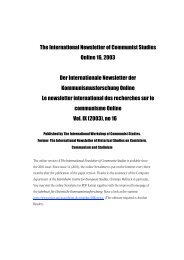VOL. XVI (2010), NO 23 - The International Newsletter of Communist ...
VOL. XVI (2010), NO 23 - The International Newsletter of Communist ...
VOL. XVI (2010), NO 23 - The International Newsletter of Communist ...
Erfolgreiche ePaper selbst erstellen
Machen Sie aus Ihren PDF Publikationen ein blätterbares Flipbook mit unserer einzigartigen Google optimierten e-Paper Software.
<strong>The</strong> <strong>International</strong> <strong>Newsletter</strong> <strong>of</strong> <strong>Communist</strong> Studies Online <strong>XVI</strong> (<strong>2010</strong>), no. <strong>23</strong> 79<br />
Viktor L. Kheifets / Lazar Kheifets, St. Petersburg State University (Russia):<br />
<strong>The</strong> Mexican Link in Spanish Communism. Michael Borodin’s Mission to the<br />
Western Hemisphere 1919-1920 and the Creation <strong>of</strong> the <strong>Communist</strong> Party <strong>of</strong><br />
Spain.<br />
Abstract: En seguida de una primera contribución de carácter más general (ver: Lazar and<br />
Victor Kheyfetz: Michel Borodin. <strong>The</strong> First Comintern-emissary to Latin America. In: <strong>The</strong><br />
<strong>International</strong> <strong>Newsletter</strong> <strong>of</strong> Historical Studies on Comintern, Communism and Stalinism II<br />
(1994/95), no 5/6, p. 145-149; III (1996), p. 184-188), el texto presente retraza, sobre la<br />
base de nuevos documentos de los archivos de Moscú, algunos aspectos concretos de la<br />
actividad del emisario Michail Markovich Borodin (de nombe original Gruzenberg) a cargo<br />
de la Internacional Comunista y del gobierno de la Unión Soviética. Las<br />
nuevas aportaciones se refieren particularmente a su actividad en España en 1919 y<br />
1920. Asi, la creación del movimiento comunista en España se revela como resultante de<br />
una historia cruzada con el nacimiento del movimiento comunista en México, devido en<br />
primer lugar a las múltiples actividades de Borodin con la ayuda del comunista<br />
estadounidense Richard Francis Phillips ("Manuel Ramírez").<br />
<strong>The</strong> general outline <strong>of</strong> the history <strong>of</strong> mutual relations between Moscow and the Spanish<br />
working-class movement is well known, and it does not differ essentially from the scheme<br />
applied to the majority <strong>of</strong> European countries (formation <strong>of</strong> a left wing within the Socialist<br />
party, split <strong>of</strong> the Socialist party, creation <strong>of</strong> a <strong>Communist</strong> party, its subsequent joining the<br />
Comintern). But the devil, as we know, is in the details. And the details are as follows:<br />
Moscow’s contacts with the Spanish working-class movement had begun earlier than<br />
assumed by a number <strong>of</strong> publications; they were <strong>of</strong> a casual, semi-adventurous character.<br />
Moreover, these contacts were not triggered by Moscow, but were initiated in the Western<br />
Hemisphere – during the mission carried out by Soviet diplomat and emissary <strong>of</strong> the 3 rd<br />
<strong>International</strong>, Michael Borodin. 1<br />
His trip was connected to a wide range <strong>of</strong> tasks: an attempt to achieve the signing <strong>of</strong> a trade<br />
and economic agreement between Soviet Russia and Mexico, a cash transport for Ludwig<br />
Martens’ mission in the USA, the formation <strong>of</strong> communist parties and groups in Latin America<br />
and the coordination <strong>of</strong> their activities. This first transatlantic trip by an emissary <strong>of</strong> the<br />
Comintern and the People’s Commissariat for Foreign Affairs <strong>of</strong> Soviet Russia was preceded<br />
by serious preparations. On April 17th, 1919, Vladimir Lenin signed papers appointing<br />
Borodin as the consul general <strong>of</strong> the RSFSR at the government <strong>of</strong> the Mexican Republic. He<br />
was entrusted to enter negotiations “for the purpose <strong>of</strong> an establishment <strong>of</strong> relations between<br />
the Governments <strong>of</strong> both Republics concerning the maintenance <strong>of</strong> friendship between them,<br />
the establishment <strong>of</strong> trade relations...”, to conclude and sign a preliminary trading agreement<br />
on behalf <strong>of</strong> the RSFSR. On March 24, Lenin met Borodin and afterwards sent a note to the<br />
People's Commissar for Foreign Trade, Leonid Krasin, requesting a meeting with the future<br />
1 Borodin’s real name was Gruzenberg, but he became famous in the international communist movement under the<br />
alias Borodin, which became his second name. For details, see: Dan N. Jacobs: Borodin. Stalin’s Man in China,<br />
Cambridge, Harvard University Press, 1981; Lydia Holubnuchy: Michael Borodin and the Chinese Revolution. 19<strong>23</strong>-<br />
1925, Ann Arbor, Columbia University Press, 1981; Lazar Jeifets, Victor Jeifets, Peter Huber: La Internacional<br />
Comunista y América Latina. 1919-1943. Diccionario Biográfico, Ginebra-Moscú, Instituto de Latinoamerica, Institut<br />
pour l’histoire du communisme, 2004, pp. 59-61; Siegfried Bahne (ed.): Origines et débuts des Partis <strong>Communist</strong>es<br />
des pays latins 1919-19<strong>23</strong>. Archives de Jules Humber-Droz I, Dordrecht, Reidel, 1970, pp. X<strong>XVI</strong>ff.














